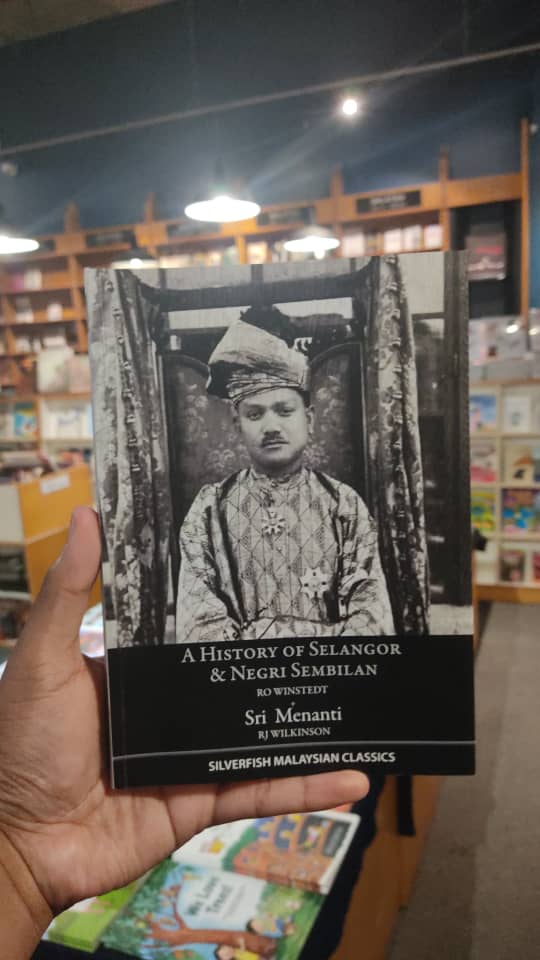A History of Selangor & Negeri Sembilan
Author: RO Winstedt & RJ Wilkinson
Publisher: Silverfish
ISBN: 9789672438113
Weight: 0.305kg
Pages: 220pp
Year: 2021
Price: RM45
Negri Sembilan, or the Nine States, is a confederacy unknown to the Portuguese d'Eredia in 1613, to the author of the Malay Annals in 1612 and to the Dutch merchants in their Daghregister or daily journal, which has been printed down to 1682. The original confederacy must have been created after the coming of the Raja Melewar, founder of the present royal house, in 1773 AD. What states originally formed the Nine is uncertain. Was it ever a confederacy or even a congeries except in name? The usual list is: Klang, Sungai Ujong, Naning, Rembau, Jelai, Ulu Pahang, Jelebu, Johol and Segamat. That list gives the States in the order in which they occur in history as more than place names, though it is not the list of any confederacy. All these places had Minangkabau settlers, but Naning was always vassal to the owners of Malacca, Klang was subject first to the Malay Sultans of Malacca and Johor and then became Bugis, Segamat was always a fief of those same Malay Sultans, Ulu Pahang and Jelai always subject to the rulers of Pahang. There may have been imperium in imperio, Minangkabau settlers in places subject to other than Minangkabau rule yet accepting a Yam-tuan of their own race as arbiter of quarrel between themselves. But if there was a real confederacy, it was that extant today and its constituent states were Sungai Ujong, Rembau, Jelebu, Johol, Ulu Muar, Inas, Gunong Pasir, Terachi and Jempul. Mostly, the settlers were agriculturists, but it must have been their experience of gold-mining in Sumatra that led a few of them as far afield as Jelai in Pahang.
Table of Contents:
PART A (pg. 7)
A History of Selangor
Chapter 1: Before the Bugis (pg. 9)
Chapter 2: The Coming of the Bugis (pg. 11)
Chapter 3: Relations with Perak, Siam and Penang (1800-1857) (pg. 23)
Chapter 4: Civil War (pg. 33)
Appendix 1: To' Engku Klang (pg. 55)
Appendix 2: Origin of the Selangor Sultanate (pg. 59)
PART B (pg. 63)
A History of Negri Sembilan
Section 1: History
The Nine States (pg. 67)
From the Fourteenth to the Sixteenth Century (pg. 69)
Johor, the Dutch and the Bugis (pg. 77)
Minangkabau Ascendancy (pg. 95)
British Intervention (pg. 103)
Section 2: The Minangkabau Polity
Mother-right and the Tribes (pg. 121)
Tribal Law of Property (pg. 130)
Criminal Law (pg. 133)
The Political System (pg. 136)
Section 3: Minangkabau Beliefs
The Medicine Man (pg. 149)
The Shaman and the Shaman's Familiars (pg. 155)
The Sacred Place (pg. 159)
Muslim Influence (pg. 163)
PART C (pg. 167)
Sri Menanti
Chapter 1: Introductory (pg. 173)
Chapter 2: The Ruling Family (pg. 175)
Chapter 3: Legendary History of the Ruling Family (pg. 180)
Chapter 4: The Position of the Yamtuan Besar (pg. 184)
Chapter 5: The Pantang Larang of the Yamtuan (pg. 188)
Chapter 6: The Regalia of the Yamtuan (pg. 190)
Chapter 7: The Consort of the Yamtuan (pg. 192)
Chapter 8: The Putera Yang Empat (pg. 193)
Chapter 9: The Ayer Kaki (pg. 196)
Chapter 10: The Orang Empat Astana (pg. 199)
Chapter 11: Minor Court Officials (pg. 201)
Chapter 12: Ceremonial (pg. 203)
Appendix A: Yamtuan Beringin (pg. 211)
Appendix B: Freak Buffaloes (pg. 213)
Appendix C: Pantang Larang List (pg. 215)
Appendix D: Tanah Datar (pg. 218)
Appendix E: Chiefs Who Mengadap Triennially (pg. 219)








